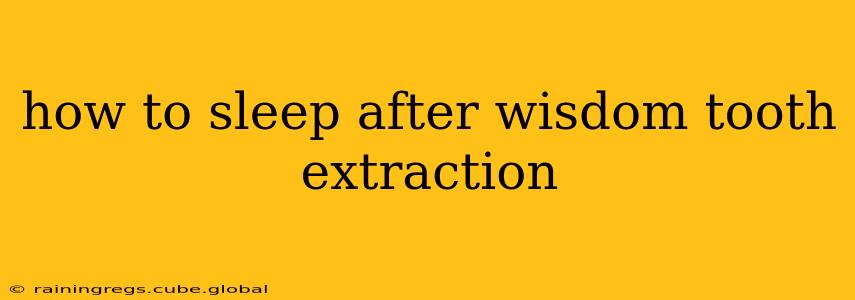Wisdom tooth extraction is a common procedure, but recovering comfortably can be tricky, especially when it comes to sleep. The pain, swelling, and potential bleeding can make finding a comfortable sleeping position challenging. This comprehensive guide will help you navigate those first few crucial nights and optimize your sleep for a faster recovery.
What to Expect After Wisdom Tooth Extraction
Before we dive into sleeping positions, let's address what you can expect post-surgery. You'll likely experience pain, swelling, and some bleeding, especially in the first 24 hours. Your dentist or oral surgeon will prescribe medication to manage the pain and inflammation. Following their post-operative instructions meticulously is crucial for a smooth recovery. This typically includes:
- Ice Packs: Applying ice packs to your cheek can significantly reduce swelling.
- Elevation: Keeping your head elevated can minimize bleeding and swelling.
- Medications: Strictly adhere to your prescribed pain medication and antibiotics.
- Diet: Stick to soft foods and avoid strenuous activities.
How to Sleep After Wisdom Tooth Extraction: Finding the Right Position
Finding a comfortable sleeping position after a wisdom tooth extraction is paramount. Here are a few suggestions:
Sleeping on Your Back:
This is often recommended as the best position. It prevents pressure on the extraction site and minimizes the risk of dislodging blood clots. Using extra pillows to prop yourself up will help keep your head elevated. This also helps reduce swelling.
Sleeping on Your Side (with modifications):
While sleeping on your side isn't ideal, it might be necessary for some people. If you must sleep on your side, try to avoid placing pressure directly on the extraction site. Use several pillows to support your head and neck and keep your head slightly elevated.
Avoid Sleeping on Your Stomach:
Sleeping on your stomach should be avoided completely after wisdom tooth extraction as it puts direct pressure on your face and can disrupt the healing process.
What if I Can't Sleep on My Back?
Many people find it difficult to sleep on their backs. Experiment with different pillow arrangements to find what works best for you. Consider using a body pillow to provide extra support and comfort. You might also try sleeping in a recliner chair temporarily if it feels more comfortable and keeps your head elevated.
Managing Pain and Discomfort for Better Sleep
Pain is a major sleep disruptor after a wisdom tooth extraction. Here’s how to manage it:
Take Your Medication as Prescribed:
Follow your dentist’s instructions precisely regarding pain medication. Don't wait until the pain is unbearable to take medication; it's much easier to manage pain proactively.
Ice Packs:
Apply ice packs to your cheek for 15-20 minutes at a time, several times a day, especially before bedtime. This can help numb the area and reduce swelling, making sleep more comfortable.
Gentle Oral Rinsing:
Your dentist may recommend a gentle salt water rinse to keep the extraction site clean. Doing this before bed can help alleviate discomfort.
What to Avoid After Wisdom Tooth Extraction
Certain things can hinder your recovery and make sleeping more difficult:
- Alcohol and Smoking: These can interfere with healing and increase the risk of complications. Avoid them completely during your recovery period.
- Strenuous Activity: Avoid strenuous exercise or activities that could increase blood pressure and disrupt the healing process.
- Hot Foods and Drinks: These can increase swelling and discomfort. Stick to cool or room temperature liquids and soft foods.
FAQs About Sleeping After Wisdom Tooth Extraction
How long will it take to recover from wisdom tooth extraction?
Recovery time varies depending on the complexity of the procedure, but you should see significant improvement within a week or two. Full recovery can take several weeks.
What if I have trouble sleeping?
If pain medication isn't enough and you're still struggling with sleep, consider talking to your dentist or doctor. They might suggest additional pain management strategies or address any underlying concerns.
When can I return to my normal sleeping position?
You should avoid pressure on the extraction site for at least a week. Gradually transition back to your preferred sleeping position once you feel comfortable and the swelling has subsided significantly.
Is it okay to use a CPAP machine after wisdom tooth extraction?
If you use a CPAP machine, continue to use it. However, make sure your face mask doesn't put pressure on the extraction site. Adjust your mask position or contact your sleep specialist if necessary.
By following these tips and addressing your concerns, you can significantly improve your comfort and sleep quality after wisdom tooth extraction, leading to a faster and more pleasant recovery. Remember, always follow your dentist's post-operative instructions carefully.
